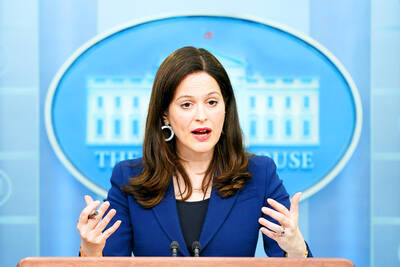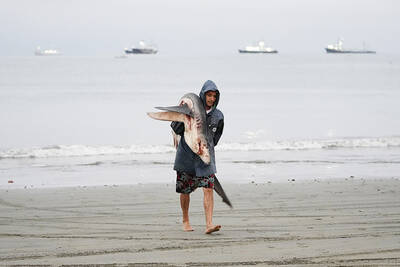Iraq’s recent efforts to avoid paying Kuwait US$25 billion in UN-mandated reparations for former Iraqi president Saddam Hussein’s 1990 invasion have alarmed Kuwaitis and strained relations that have slowly improved since the fall of the Iraqi dictator.
Many Kuwaitis doubt Iraq will make good on its obligations without outside pressure, and the country has sent envoys to both Washington and the UN in recent months to seek help.
“Iraq will not cooperate if things are left to bilateral ties,” said Fayez al-Enezi, a member of a search team tasked with finding hundreds of Kuwaitis who went missing during the Iraqi occupation.
But Iraqi Prime Minister Nouri al-Maliki has waged his own offensive, pressing key UN members during a visit to the US late last month to drop all binding resolutions against his country stemming from Hussein’s seven-month occupation of Kuwait.
US President Barack Obama has expressed support for lifting UN sanctions, among them a requirement that Iraq pay 5 percent of its oil revenues to Kuwait as reparations. However, he said Iraq’s UN status should only be changed after the country resolves disputes with its neighbors — something Kuwaitis have been seeking for almost two decades.
The UN has approved US$52.4 billion in compensation for individuals, companies and organizations, most of them Kuwaiti, that incurred losses in the war that followed Saddam’s invasion. About US$27 billion has already been paid out from Iraqi oil revenues, leaving an outstanding balance of about US$25.4 billion.
Money isn’t the only thing at stake. The UN resolutions place a number of other obligations on Iraq, ranging from helping search for missing Kuwaitis to returning looted possessions. But Kuwaitis complain Iraq has provided little cooperation.
El-Enezi said the search for missing people has gone extremely slowly and 369 people are still unaccounted for. His team has found the remains of 236 people in mass graves in Iraq who were shot in the back of the head.
“We will never trust them,” said civil servant Talal al-Otaibi, while sipping coffee in one of Kuwait City’s busiest malls. “Iraq will never leave us alone ... Iraqis still believe Kuwait is part of Iraq.”
Iraq has made territorial claims on Kuwait ever since the country gained independence from the UK in 1961. Baghdad grudgingly approved a UN demarcation of their shared border in 1994 that placed 11 oil wells on the Kuwaiti side of the desert frontier. The two governments are still negotiating an agreement to drill joint border fields.
Iraqi Foreign Minister Hoshyar Zebari said his government’s efforts to shake off the UN resolutions were not aimed at compromising its smaller neighbor’s sovereignty.
“We in Iraq need to make some ... real initiatives to dissipate those fears,” he told the Kuwait news agency.
Sami al-Faraj, who heads the independent Kuwait Center for Strategic Studies, said Iraq could generate some goodwill by returning Kuwait’s national archives that were taken during Saddam’s invasion.
“We’re talking about historic documents, about proof we are not Iraqis, and [returning them] will not cost them billions,” he said.
Kuwait looked forward to improved ties after the 2003 US-led invasion that toppled Hussein. The country reopened its diplomatic mission that it had closed after Hussein’s invasion and appointed an ambassador. But it is still waiting for Iraq to reciprocate. The Iraqi Embassy in Kuwait is headed by a charge d’affaires.
“In 2003, after the fall of Saddam’s regime, we had high hopes,” political analyst Ayed al-Mannah said. “Now we hear the same old language ... all over again.”
Hajji al-Jasser, a 58-year-old businessman who was abroad when Iraqi tanks rolled into his country, said Kuwaitis did not hate Iraqis but were afraid of their “reckless” politicians. He said Kuwaitis should not give up a penny to make the point that Iraq’s past behavior should be punished and not repeated.
Kuwait has taken a similarly hard line, refusing to cave to pressure from Washington to forgive US$15 billion of Hussein-era debts.
UN Secretary-General Ban Ki-moon urged Iraq and Kuwait on Monday to discuss alternative ways to settle outstanding war reparations, suggesting the possibility of converting them into investments to help Iraq’s reconstruction.

WAKE-UP CALL: Firms in the private sector were not taking basic precautions, despite the cyberthreats from China and Russia, a US cybersecurity official said A ninth US telecom firm has been confirmed to have been hacked as part of a sprawling Chinese espionage campaign that gave officials in Beijing access to private texts and telephone conversations of an unknown number of Americans, a top White House official said on Friday. Officials from the administration of US President Joe Biden this month said that at least eight telecommunications companies, as well as dozens of nations, had been affected by the Chinese hacking blitz known as Salt Typhoon. US Deputy National Security Adviser for Cyber and Emerging Technologies Anne Neuberger on Friday told reporters that a ninth victim

Russia and Ukraine have exchanged prisoners of war in the latest such swap that saw the release of hundreds of captives and was brokered with the help of the United Arab Emirates (UAE), officials said on Monday. Ukrainian President Volodymyr Zelenskiy said that 189 Ukrainian prisoners, including military personnel, border guards and national guards — along with two civilians — were freed. He thanked the UAE for helping negotiate the exchange. The Russian Ministry of Defense said that 150 Russian troops were freed from captivity as part of the exchange in which each side released 150 people. The reason for the discrepancy in numbers

A shark attack off Egypt’s Red Sea coast killed a tourist and injured another, authorities said on Sunday, with an Italian Ministry of Foreign Affairs source identifying both as Italian nationals. “Two foreigners were attacked by a shark in the northern Marsa Alam area, which led to the injury of one and the death of the other,” the Egyptian Ministry of Environment said in a statement. A source at the Italian foreign ministry said that the man killed was a 48-year-old resident of Rome. The injured man was 69 years old. They were both taken to hospital in Port Ghalib, about 50km north

MISSING: Prosecutors urged the company to move workers out of poor living conditions to hotels, but residents said many workers had already left the town Brazil has stopped issuing temporary work visas for BYD, the Brazilian Ministry of Foreign Affairs said on Friday, in the wake of accusations that some workers at a site owned by the Chinese electric vehicle producer had been victims of human trafficking. The announcement came days after labor authorities said they found 163 Chinese workers who had been brought to Brazil irregularly in “slavery-like” conditions at the BYD factory construction site in the northeastern state of Bahia. The workers were employed by contractor Jinjiang Group, which has denied any wrongdoing. Later, the authorities also said the workers were victims of human trafficking,